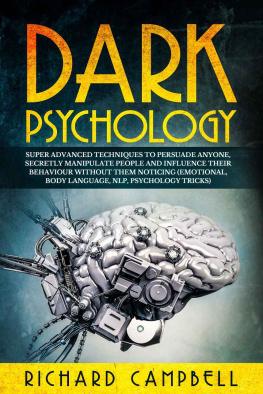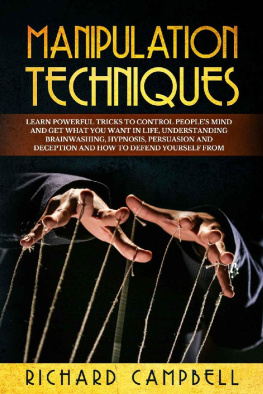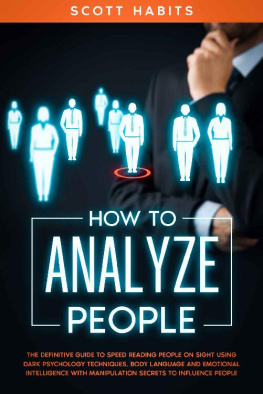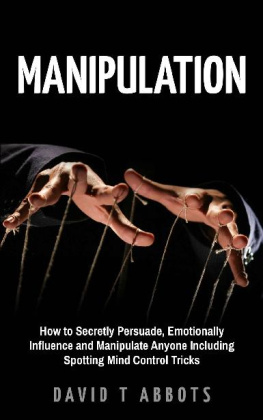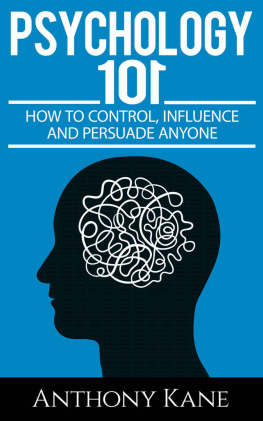Richard Campbell - Dark Psychology: Super ADVANCED Techniques to PERSUADE ANYONE, Secretly MANIPULATE People and INFLUENCE Their Behaviour Without Them Noticing (Emotional, Body Language, NLP, Psychology Tricks)
Here you can read online Richard Campbell - Dark Psychology: Super ADVANCED Techniques to PERSUADE ANYONE, Secretly MANIPULATE People and INFLUENCE Their Behaviour Without Them Noticing (Emotional, Body Language, NLP, Psychology Tricks) full text of the book (entire story) in english for free. Download pdf and epub, get meaning, cover and reviews about this ebook. year: 2019, genre: Science. Description of the work, (preface) as well as reviews are available. Best literature library LitArk.com created for fans of good reading and offers a wide selection of genres:
Romance novel
Science fiction
Adventure
Detective
Science
History
Home and family
Prose
Art
Politics
Computer
Non-fiction
Religion
Business
Children
Humor
Choose a favorite category and find really read worthwhile books. Enjoy immersion in the world of imagination, feel the emotions of the characters or learn something new for yourself, make an fascinating discovery.
- Book:Dark Psychology: Super ADVANCED Techniques to PERSUADE ANYONE, Secretly MANIPULATE People and INFLUENCE Their Behaviour Without Them Noticing (Emotional, Body Language, NLP, Psychology Tricks)
- Author:
- Genre:
- Year:2019
- Rating:4 / 5
- Favourites:Add to favourites
- Your mark:
- 80
- 1
- 2
- 3
- 4
- 5
Dark Psychology: Super ADVANCED Techniques to PERSUADE ANYONE, Secretly MANIPULATE People and INFLUENCE Their Behaviour Without Them Noticing (Emotional, Body Language, NLP, Psychology Tricks): summary, description and annotation
We offer to read an annotation, description, summary or preface (depends on what the author of the book "Dark Psychology: Super ADVANCED Techniques to PERSUADE ANYONE, Secretly MANIPULATE People and INFLUENCE Their Behaviour Without Them Noticing (Emotional, Body Language, NLP, Psychology Tricks)" wrote himself). If you haven't found the necessary information about the book — write in the comments, we will try to find it.
Richard Campbell: author's other books
Who wrote Dark Psychology: Super ADVANCED Techniques to PERSUADE ANYONE, Secretly MANIPULATE People and INFLUENCE Their Behaviour Without Them Noticing (Emotional, Body Language, NLP, Psychology Tricks)? Find out the surname, the name of the author of the book and a list of all author's works by series.
Dark Psychology: Super ADVANCED Techniques to PERSUADE ANYONE, Secretly MANIPULATE People and INFLUENCE Their Behaviour Without Them Noticing (Emotional, Body Language, NLP, Psychology Tricks) — read online for free the complete book (whole text) full work
Below is the text of the book, divided by pages. System saving the place of the last page read, allows you to conveniently read the book "Dark Psychology: Super ADVANCED Techniques to PERSUADE ANYONE, Secretly MANIPULATE People and INFLUENCE Their Behaviour Without Them Noticing (Emotional, Body Language, NLP, Psychology Tricks)" online for free, without having to search again every time where you left off. Put a bookmark, and you can go to the page where you finished reading at any time.
Font size:
Interval:
Bookmark:

Dark Psychology Secrets
Learn powerful manipulation techniques to control peoples minds and get what you want in life; understanding how brainwashing, hypnosis, persuasion, and deception work and how to defend yourself from.
Copyright 2019 - All rights reserved.
The content contained within this book may not be reproduced, duplicated or transmitted without direct written permission from the author or the publisher.
Under no circumstances will any blame or legal responsibility be held against the publisher, or author, for any damages, reparation, or monetary loss due to the information contained within this book. Either directly or indirectly.
Legal Notice:
This book is copyright protected. This book is only for personal use. You cannot amend, distribute, sell, use, quote or paraphrase any part, or the content within this book, without the consent of the author or publisher.
Disclaimer Notice:
Please note the information contained within this document is for educational and entertainment purposes only. All effort has been executed to present accurate, up to date, and reliable, complete information. No warranties of any kind are declared or implied. Readers acknowledge that the author is not engaging in the rendering of legal, financial, medical or professional advice. The content within this book has been derived from various sources. Please consult a licensed professional before attempting any techniques outlined in this book.
By reading this document, the reader agrees that under no circumstances is the author responsible for any losses, direct or indirect, which are incurred as a result of the use of information contained within this document, including, but not limited to, errors, omissions, or inaccuracies.
Table of Content
Chapter 1: Dark Psychology 101
In a utopian world, all human beings would look out for each other. Neighbors would be friends, colleagues in the corporate world would not be cutthroat in their competitiveness, and strangers would all be kind. There would be no theft, kidnappings, or even murder. There would just be perfect happiness and harmony. You could go about your business without worrying that someone was trying to take advantage of you. You could leave your bank cards unattended because nobody would be trying to steal from you. Sleeping with your windows and doors open would be the norm. Identity theft would not exist. Jails would become obsolete, and women could walk in the dark without worrying about getting attacked. Unfortunately, this is not the kind of world we live in.
In the real world, people use and abuse each other all the time. It almost seems that there is always someone waiting to take advantage of you at every turn. In todays world, where physical boundaries have been obliterated by the Internet and numerous other technologies, you are at an even greater risk of being preyed upon by other humans. Not only are you being preyed on by the people you interact within the physical world, but there is also the additional threat of virtual predators. Suffice to say, humans have become even more predatorial than wild animals.
Most people would rather believe the best of everyone they meet until proven otherwise. Think about it. When you meet a new person, do you often think of them as a good person or a bad person? High chances are, you want to hope everyone has as kind a heart as you do. That they would never do anything to harm you or another. If you go through life believing that everyone is as good as you are (assuming that you are indeed a good person), you are at a very high risk of getting manipulated and taken advantage of.
Lets back up a little.
When a human being is born, they are born with some inherent qualities that are critical for their survival. For instance, a baby is born with the ability to cry in order to get their needs met by another person. This is because the baby indeed needs another person to cater to them because they are too little to get anything done on their own. As such, a baby will cry when it needs to be fed, cry when it needs to sleep, cry when it needs comfort...cry for just about anything. Nobody trained this baby to cry--it is a survival tool it came with straight from the womb. If the parents of this baby do not set particular boundaries as far as responding to the babys requests, the baby learns that it can get just about anything by crying. This is how manipulation begins. That is not to mean that parents are solely responsible for the breeding of manipulators. While parents contribute to the development of manipulative behavior by virtue of genetics and the kind of nurturing, or lack thereof, provided to offspring, there are other factors at play. At the very core of our being, we are selfish beings. We want the best for ourselves first, and others later. For some people, there is a line as to what extent they are willing to go to get the best for themselves. For others, the line is blurry and sometimes even non-existent. Where the line is blurry or does not exist is where dark psychology begins.
Dark psychology in the simplest terms is the study of predatory human behavior. In other words, dark psychology explores humans as they prey on other humans for their own benefit. It dives into the much darker side of human consciousness, where conscience, empathy, and selflessness are unheard of. Dark Psychology seeks to understand why some humans do not seem to have any qualms about causing others harm as long as they stand to gain something from it. Dark psychology acknowledges that not everyone is a nice person, however inclined you may be to think so, and then tries to answer why that may be the case.
Human predatory behavior is something that has been in existence since the beginning of time. Humans have always preyed upon each other. This is a constant fact; only the methods of predation change. Typically, human beings utilize two main channels in their predation: intragroup and intergroup, which are internal and external channels, respectively.
Intragroup versus intergroup predation
In any group of people such as a society, community, county, or region, where there are shared similarities, there are typically superior and inferior parties. The superiority or inferiority is often determined by what the group of people defines to be the criteria for the same. For instance, it might be the economic power or the social class or so on. Often, youll find that the superior parties prey on the inferior ones for their own advancement. When this happens, intragroup predation is at play. A group of corporations setting up industries in a residential area occupied by poorer residents is an example of intergroup predation. In this instance, the richer section of society has no reservations about harming another less fortunate section that is vulnerable and easy prey on.
If a group considers itself to be superior to another group and preys on them (externally), this is referred to as intergroup predation. That is predation between two or more different groups. This is essentially what happened during colonization where European countries invaded other countries that they considered inferior and uncivilized, for their own benefit.
In your everyday life, you may not consciously notice the predators in your midst. Human predators are highly skilled at blending in with the rest of the population. They look like normal people leading relatively normal lives. Whenever there is a murder or any other criminal incident in a community, youll often hear a member of the community say of the perpetrator: he was such a good man, well-liked by everybody in town. We would never have suspected that he was capable of such an evil act. The truth of the matter is that the suspect was not really a good man. More often than not, he was just a bad man disguised as a good man. Of course, the terms bad and good do not do any justice in explaining the complex and often confusing elements that play a part in causing one to choose to become a predator.
Font size:
Interval:
Bookmark:
Similar books «Dark Psychology: Super ADVANCED Techniques to PERSUADE ANYONE, Secretly MANIPULATE People and INFLUENCE Their Behaviour Without Them Noticing (Emotional, Body Language, NLP, Psychology Tricks)»
Look at similar books to Dark Psychology: Super ADVANCED Techniques to PERSUADE ANYONE, Secretly MANIPULATE People and INFLUENCE Their Behaviour Without Them Noticing (Emotional, Body Language, NLP, Psychology Tricks). We have selected literature similar in name and meaning in the hope of providing readers with more options to find new, interesting, not yet read works.
Discussion, reviews of the book Dark Psychology: Super ADVANCED Techniques to PERSUADE ANYONE, Secretly MANIPULATE People and INFLUENCE Their Behaviour Without Them Noticing (Emotional, Body Language, NLP, Psychology Tricks) and just readers' own opinions. Leave your comments, write what you think about the work, its meaning or the main characters. Specify what exactly you liked and what you didn't like, and why you think so.

